
The Ministry for Primary Industries is responding to animal welfare issues at flood-affected farms at the top of the South Island, but concedes the actual number of livestock deaths is unknown.
Many farmers moved stock to higher ground ahead of the first flooding event in Tasman, Nelson and Marlborough late last month.
The area sustained widespread damage to farm fencing infrastructure, caused in part by raging rivers, which was exacerbated by a second flooding event last week.
MPI national response manager for agriculture and investment services Andrew Curtis said damaged fencing was a huge issue for farms and orchards.
He said compromised fencing had lead to ongoing animal welfare reports from the public.
"We do know that there's a fair amount of stock that were lost to water over the two events," Curtis said.
"In terms of the animal welfare cases, every day we're getting more reports coming in that we're having to follow up with, obviously of animals not necessarily in a good way, as a result of the flood."
He said access to cut-off farmland was a challenge.
"Not all farmers know what the condition of their animals are yet. There's still a number of places where access to the whole farm isn't necessarily available."
Nelson-based mussel farming company MacLab told RNZ its staff reported seeing dead livestock floating out in the water.
Fifth-generation farmer Ian Parkes, of Eighty Eight Valley, told RNZ he decided to slaughter and sell some stock due to pressures on animal feed stocks, and not being able to move stock.
Meanwhile, in a statement, MPI director of compliance and response Glen Burrell said most farmers knew their properties and proactively moved stock when severe weather like heavy rain was forecast.
"However, in some cases, floodwaters rise higher than expected, isolating animals or damaging fencing used to contain them," he said.
"MPI received reports of a small number of livestock losses as a result of the severe flooding, but the exact quantity of animals is not known."
Burrell said it supported landowners and local councils where needed to ensure safe livestock disposal.
"MPI has dedicated staff available to respond to animal welfare issues," he said.
"We have been proactively visiting properties and farms which are at-risk because they're located in flood-affected areas, to check on the wellbeing of animals and farmers."
Any animal welfare reports or concerns can be made to its animal welfare team on 0800 008 333.



















